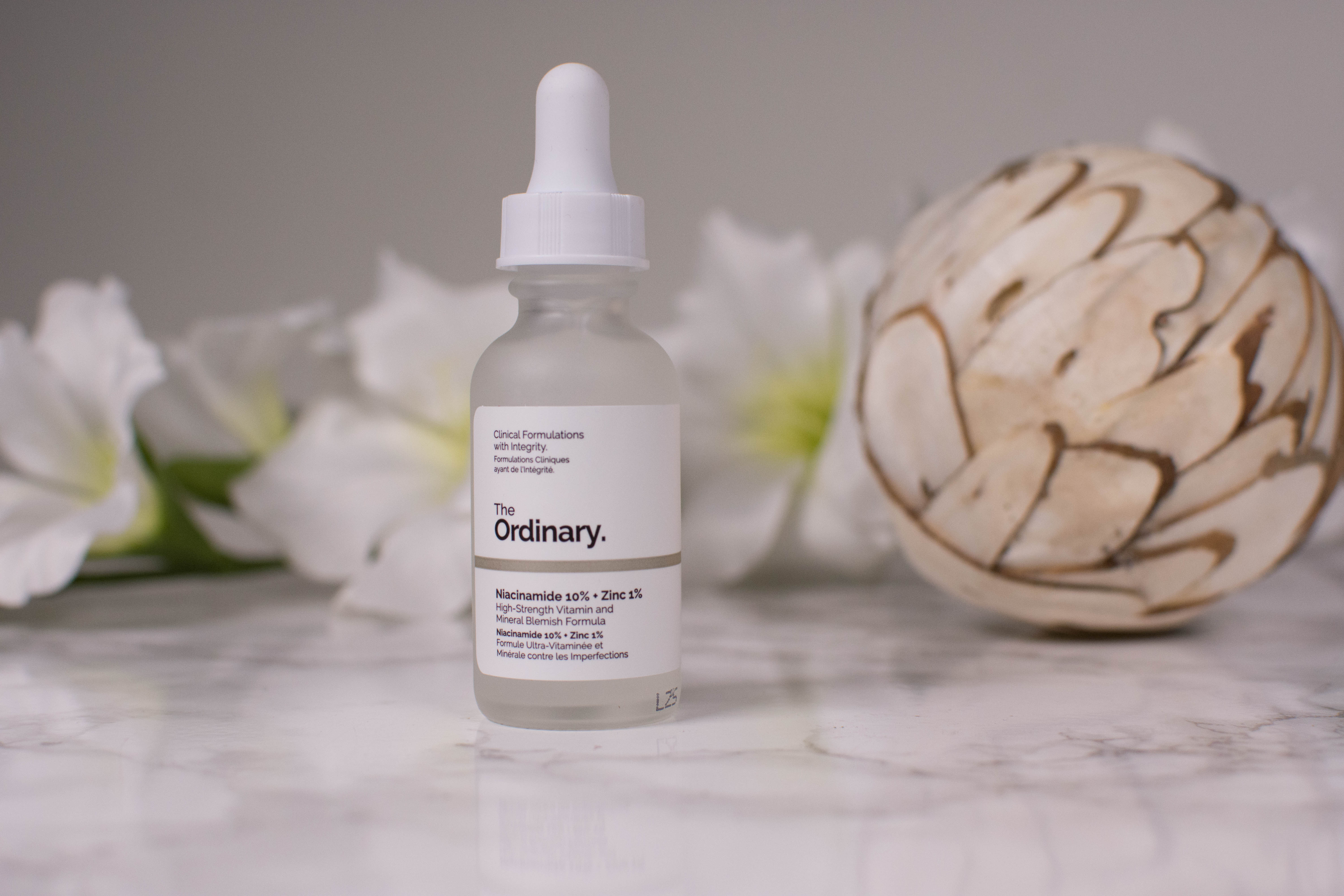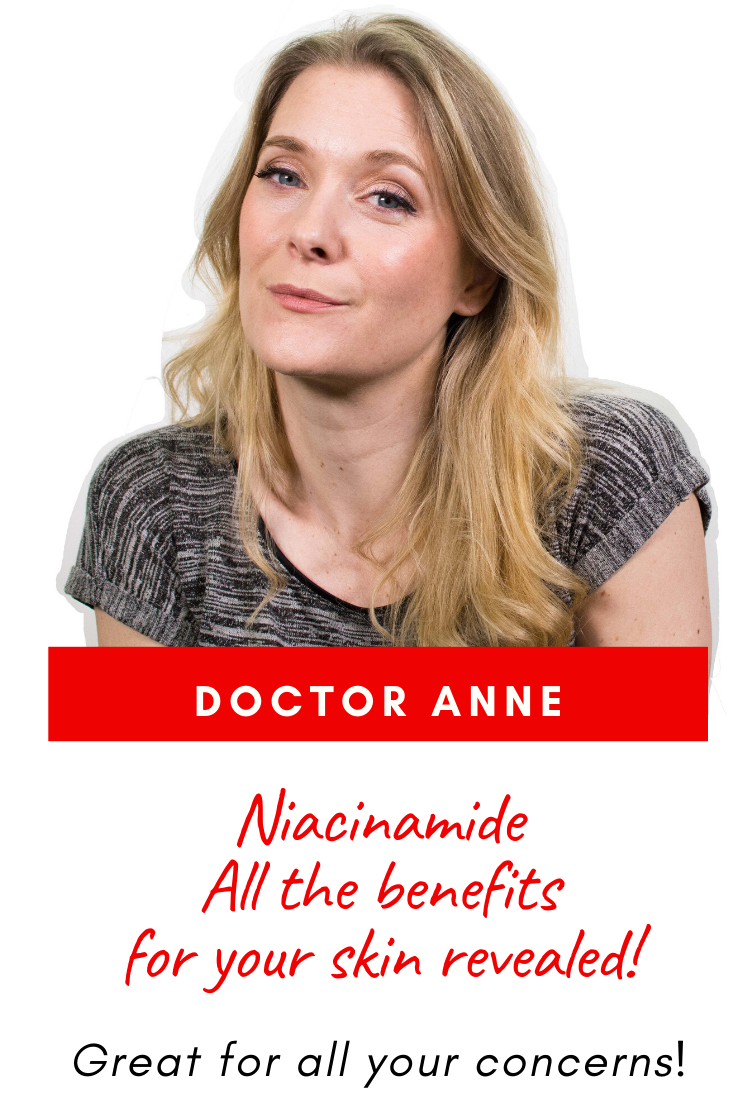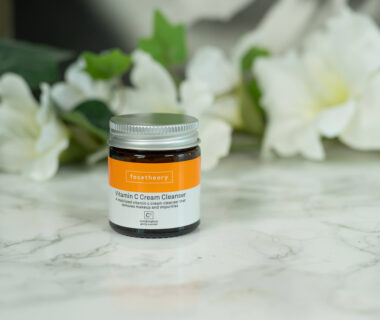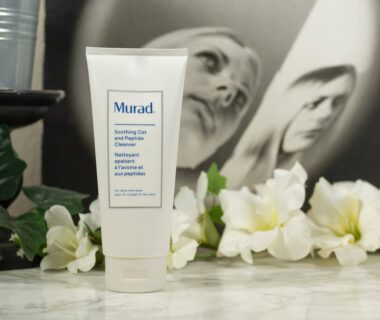ADVERTISEMENT INFO: THIS BLOG POST CONTAINS AFFILIATE LINKS AND GIFTED PRODUCTS (PR). I RECEIVED NO MONEY TO WRITE IT. PLEASE READ DISCLAIMER.
I have stated in numerous videos that I think Niacinamide is an amazing ingredient, so I figured it was about time I told you why:
Why do I love Niacinamide so much and what can it do for your skin, especially if it is dehydrated or acne prone? Oh, and of course if you have large pores – they seem to be one of the top concerns out there judging by the comments.

So in todays post we will talk about what Niacinamide actually is, where you can get it from, how it works for and in the skin and, as last step, take a look at different skin conditions to see if using Niacinamide is recommended for them.
What is Niacinamide?
Niacinamide is also known as Vitamin B 3 and is the pyridine 3 carboxylic acid amide form of niacin. It is a water-soluble Vitamin, which means it will not be stored in the body, any excess is readily peed out. Niacinamide controls the NFκB-mediated transcription of signaling molecules by inhibiting the nuclear poly (ADP-ribose) polymerase-1 (PARP-1), which will most likely not tell you much, but I will get into that a little later.

Where do I get Niacinamide from?
Availability via food is usually not a problem if you eat a balanced diet, as it is available via meat, liver, green leafy vegetables, wheat, oat, palm kernel oil, legumes, yeast, mushrooms, nuts, milk, fish, tea, and coffee. Yet another reason to drink more tea! It is also part of many skincare items for topical application.
What can Niacinamide do for my skin?
First and foremost Niacinamide is an antioxidant, so it has the ability to block free radicals caused by stress, UV exposure and pollution and reduce the damage done to the cell. It also plays a role in the synthesis of skin lipids, especially ceramides, which are crucial for an intact skin barrier. Through that pathway it helps reduce transepidermal waterloss (TEWL), which in turn helps combat dry spots and flaky skin (read more about transepidermal waterloss here).
Another benefit is it´s anti inflammatory abilities (it blocks the activation of NF-kappaB transcription factor by inhibiting the enzymePoly ADP Ribose Polymerase-1 – I told you it was useful information!) and the fact that it reduces sebum production, great for all inflamed skin diseases like acne and rosacea.
If you struggle with hyperpigmentation, the mechanism you might be most interested in is the fact that Niacinamide inhibits the transport of melanosomes to the keratinocytes, which means the dark pigment to the skin cells, so it helps with overall brightening of the skin (Another ingredient that helps with that is Vitamin C, read here, and Tranexamic Acid, read here).
Niacinamide has also shown to reduce pore size, by which exact mechanism though still remains unclear. It seems to be a mixture between stabilizing the pore lining and reducing sebum production, so the pore doesn’t get as dilated, and by actively tightening it in higher concentrations.
How much Niacinamide do I need in order for it to be effective?
To be honest, we don’t really know. What we do know is that the concentration should be between 10 to 20% in order to see visible results. We have yet to determine both the most effective concentration (is it the more the better? Or is 10% as good as 20%?) and the maximum concentration after which only the risk of side effects increases, but not the benefits for the skin.
Are there any side effects to using Niacinamide?
For the most part Niacinamide is safe to use and adverse reactions are rare. Allergies against the ingredient are possible, but not common, and very sensitive skins can react with redness and irritation, in which case you should of course stop using the product.
Is Niacinamide good for acne?
Yes, because of ist anti inflammatory action and because it reduces sebum production. Less sebum means less breading ground for bacteria.
The anti inflammatory effect will also help reduce the side effects of other, more aggressive therapy options like retinoids (read more about them here) and benzoyl peroxide.
Try: The Ordinary Niacinamide 10% + Zinc 1% Serum (full review here)

Is Niacinamide good for eczema?
Yes, because it helps repair the skin barrier and is anti inflammatory. An increase in skin lipids like ceramides should repair the skins barrier function (more about a damaged skin barrier here), reducing the amount of dryness and irritation you get
Try: Paulas Choice 10% Niacinamide Booster with extra Panthenol for soothing
Is Niacinamide good for hyperpigmentation?
Yes, because int hinders the transport of dark pigment into the skin cells. The effect is slow and gradual though, so you best use it as part of a dedicated hyperpigmentation fighting regime, like retinoids, acids, Arbutin, Tranexamic Acid, Hydroquinone and Vitamin C.
Try: Good Molecules Niacinamide Brightening Toner, which combines Niacinamide with Arbutin and a Vitamin C derivative (full review here)

Is Niacinamide good for large pores?
Yes, but again best combined with things like salicylic acid. The key to smaller looking pores is clean pores so they don´t get stretched, which means regular exfoliation is a must.
Try: Paula´s Choice 20% Niacinamide Booster (even though I have not tried that one myself, my friend Jenny over on Geeky Posh did and it apparently worked a miracle on her pores).
Bottom line
Niacinamide is an ingredient that is widely available, well tolerated and effective for many different skin concerns and earned it´s place among my preferred skincare ingredients. It is not a miracle worker, but a great addition to your routine no matter what problem you are trying to solve. Niacinamide is basically the swiss army knife of skincare.

Shop the post


